I’m Glenn Pougnet and this is #MYCHARITY
This week for the #MYCHARITY interview series, we speak to Glenn Pougnet, Director at StreetSmart, a charity that aims to support homeless organisations by providing the most personal and effective care for individuals in need.
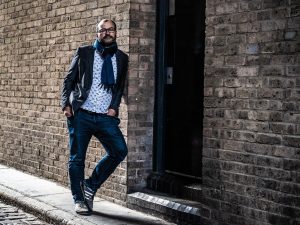
Location: London
Current job: StreetSmart Charity Director
One word that best describes how you work: Juggling
Your biggest success: Raising £7 million for the homeless
Your greatest fear: Being lonely
Your biggest dream: Opening the batting for ENGLAND
Your favourite movie: Bladerunner
Your role model: My grandmother
First of all, tell us a little about your background and how you got to where you are today.
I was born and raised in Essex, a mixed-race family, the first member in my wider family to go to University. Growing up in the eighties, I hated seeing inequalities not just being tolerated but lauded as a good thing. I worked in Publishing for 13 years until I took over at StreetSmart in 2006 despite not knowing much about fundraising or homelessness. Been blagging it ever since.
Tell us more about StreetSmart and what has been the impact of the pandemic on your workday?
We are a small team that run a successful fundraising campaign working with restaurants, pubs and hotels during the build-up to Christmas. The pandemic greatly affected the hospitality industry and therefore frustratingly for us it meant a huge reduction (approx. £500,000) to the funds we raised. Although communication with the team and participants was relatively easy to maintain we struggled to implement the physical aspects the campaign requires – deliveries of collateral, visits to promote. We are all very much people persons so we’ve missed that day to day contact and the constructive mixing of business and pleasure over lunch.
How much digitalisation has helped the charity sector and StreetSmart in these difficult times?
Huge help when it comes to communication and getting our message out. It has also helped when looking at alternative ways of fundraising We’ve tapped into the food delivery boom and had successful online raffles and virtual cook along.
StreetSmart has incredible partnerships with some of the best restaurants in London and the UK, how challenging has been to grow so quick?
We’ve been around since 1998 and started with 30 restaurants so I would say it’s been a steady growth to now 600+. Some of that growth has been organic – owners expanding, chefs from established restaurants setting up on their own but bringing StreetSmart with them. High staff turnover in hospitality means keeping a good, up to date contact list is important in order to help maintain those prized relationships with supporters. Also, the key to our growth has been our sponsors – LandAid who cover all our central costs and make it possible for us to plan properly for the years ahead which is gold dust in these uncertain times.
Can you share a few tips StreetSmart has used to create such an incredible cause/brand awareness?
Keep it simple – It‘s a great idea for the right cause at the right time of year. We’ve tried to keep it consistent and sustainable and never getting greedy and I think the industry has responded to that. Good media partner support and respected industry endorsements have helped create a strong and trusted brand.
In your opinion, which digital channel is working best to communicate to your donors/supporter?
That’s probably Instagram now given the foodie world we operate in.
How do you recharge? What do you do when you want to forget about work?
Play with my twin toddlers although that’s like another exhausting job so hardly unwinding. I like cooking although the lockdown has exhausted my repertoire, I still find chopping vegetables therapeutic.
What are you currently reading, or what’s something you’d recommend?
Grace Dent’s book HUNGRY
Fill in the blank: I’d love to see _____ answer these same questions.
Edmund Elephant from Peppa Pig, he’s a clever clog.
What’s the best advice you would give to Millennials who want to approach the non-profit sector?
Learn a bit about business first – the best organisations and individuals I’ve encountered in the sector have some business acumen and operate efficiently. Add flair and enthusiasm to that grounding and you’ll make a difference, who knows you may even make the world a better place. You don’t necessarily have to think out of the box – as so many problems just require a better box.
You can follow @StreetSmartuk on Instagram
We love to interview charity’s leaders and listen to their work and their way to create great partnerships. If you want to learn more about how your Purpose-Cause match can be effective and well-communicated check how we can help.
I’m Andrea from Crazy Fork and I’m a #WORLDCHANGER
This week on the #WORLDCHANGERS series, we speak to Andrea, a King’s College student who launched a new innovative platform, The Crazy Fork, where teenagers and grandparents can meet cooking online and create lasting memories, with the aim to keep company to the eldest and do something good for the community.
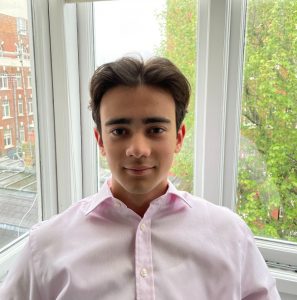
Location: London
Current job: Kings College student
My favourite movie: Mamma mia
My comfort food: Pasta with tomato sauce
First of all, tell us a little about you
I am a 17-year-old studying at Kings College School Wimbledon. I was born and raised in Milan, and we moved to London when I was 11 years old. Since I was a kid I have always loved watching my mom cook, and with time I began helping her as I was able to learn more about cooking
How you got the idea of Crazy Fork?
Crazy Fork is an idea that births from my love for cooking good food and the memories that stem from it with my grandparents before COVID and the wish to have a social impact on the community. I noticed lockdown has hit my grandparents and many like them especially hard, and whilst I was looking for a way to make them smile again during the lonely period, it struck me that the best way to keep them company was talking to them about their recipes and cooking with them online.
From the concept to the Crazy Fork launch how long did it take?
It took us a few months to develop the initial raw idea into a finished website, yet Crazy Fork is always a work in progress as we look to improve and reach more and more people. Lately, I have started a TikTok account to promote the website and its recipes. There have been many challenges throughout the process, and for me, the biggest challenge was trying to put constant work in the website alongside school and extra-curricular commitments.
Can you describe exactly how Crazy Fork works and in what is different from others recipes Blogs?
Crazy Fork is no ordinary cooking website. At Crazy Fork, we encourage people to call their relatives who may be feeling lonely during these lockdowns and share some recipes you find on our website or ask them to share with you their traditional family recipes and cook together through a zoom or facetime call. This would allow you to keep them company as it gives an opportunity to talk to and see your relatives. And of course, we would love to receive the recipes you cooked together!
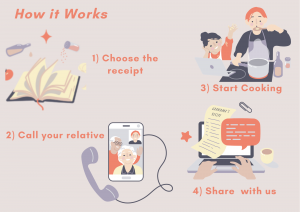
Crazy Fork is aimed at two far apart generations teenagers and grandparents, which of the two generations was more responsive
I think that the teenagers were more responsive especially on our TikTok platform as many showed they were keen to call up their grandparents and spend some time cooking with them.
Crazy Fork is a great example of how digital can help people to feel less lonely and create a bridge between two generations, do you know any other platform that does a similar job?
Sadly, I noticed that there are not many platforms around that actually encouraged reaching out to lonely people during this tough period. That is why I came up with Crazy Fork, as for what better way is there to spend some time together than cooking!
Generation Z is digitally native, do you believe that this has been an advantage for your generation?
I believe that for my generation it has been an advantage as it allows us to be more interconnected, and despite the negatives of social media, it has been seen recently that it can be used effectively to spread awareness on important matters. Additionally, there is a point to be made that the digital world disincentives personal interactions; however during this crisis, the importance of connectivity has really been key for the wellbeing of many people.
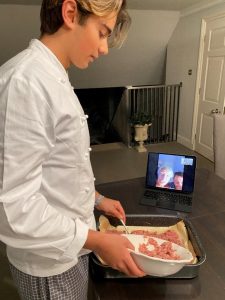
Crazy Fork will put together a recipe book to help charities for the elderly; where can we buy the book?
I am planning to run a fundraiser in the next months in order to raise some money to publish a book in order to give the profits to charities for the elderly. The book will be made with recipes that were sent to us by our users. Check our platforms for more updates on the book!
How do you recharge? What do you do when you want to forget about school?
I love to travel with my family and I think it really gives me the opportunity to escape both physically and mentally from the stresses of school and examinations. When I am home, I love watching Juventus play and hanging out with my friends which is always a great way to recharge from a tiring full week.
Last but not least, a dream for your future?
When I was young I had always dreamed to maybe open up a restaurant sometime, as well as becoming a football manager!
You can follow The Crazy Fork on Tik Tok
We love to interview #WORLDCHANGERS and listen about their challenges and their achievements. We can help you analyze your Google Analytics data to understand where your visits come from, who are your users and which are the most visited pages, providing bespoke reports on a specific period. After this deep analysis, we can support you to optimize your Brand Strategy to reach your business goals.
I’m Mauro Sanna from Olivo Restaurants and I’m a #WORLDCHANGER
This week on the #WORLDCHANGERS series, we speak to Mauro Sanna, owner and founder of Olivo chain, four restaurants, a deli, and a gelateria. All places are famous for the authenticity and quality of the food.
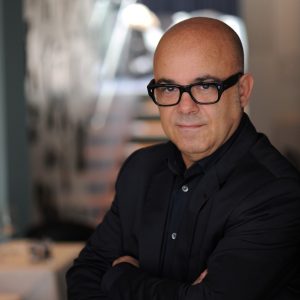
Location: Belgravia, London
Current job: Owner and founder of Olivo & Oliveto
One word that best describes how you work: hard
My role model: My uncle
My biggest fear: Opening Olivo in the middle of a recession in 1990
Something I love: Cigars and good food and wine
Something I hate: Bureaucracy
First of all, tell us a little about your background and how you got to where you are today
I was born in Sardinia, Italy and came to London in 1977, hoping to learn English in six months with an ambition to study architecture. I decided to become a restauranteur when I fell in love with the city but saw the quality of food in London could be improved and saw a huge opportunity to bring Sardinian cuisine over here.
Do you believe that import Sardinian delicacy has been the winning idea for your business success?
Yes, I think that it definitely helps my business to be more competitive and gives us a deeper and genuine identity.
Which restaurant was the first and how you managed to expand your chain to six places, becoming a point of reference for your local community?
In 1990 I opened Olivo and quickly established a local and loyal clientele. Following its success and have kept all the funds in the company we were able to expand the business to three more restaurants, a delicatessen and gelateria. I had the long-sighted view of creating a small but compact business that is manageable and allows me to get to know our regulars and what they want.

Tell us about a moment when you knew that it was all worth the hard work.
After opening Olivomare 10 years ago which was the third restaurant to open.
How did you adjust your business in this unusual time?
From day one we set up a well-organised takeaway operation with Deliveroo as well as deliveries to locals that allowed us to keep in touch.
What do you think will be the next big thing in the hospitality sector?
I reply with a question: What is the next small thing?
If you knew then what you know now, what would you have done differently?
Nothing.
How do you recharge? What do you do when you want to forget about work?
I have a house in Sardinia where I go to when I get the chance to take a week off and like to spend time with my wife and family relaxing and gardening.
Last but not least, what is the best Olivo’s dish we can now order on Deliveroo?
Any one of our Pizza’s from Oliveto made from 100% Sardinian ingredients.
You can follow Olivo on Instagram here
We love to interview #WORLDCHANGERS and listen about their challenges and their achievements. We can help you analyze your Google Analytics data, in order to understand where your visits come from, who are your users and which are the most visited pages, providing bespoke reports on a specific period. After this deep analysis, we can support you to optimize your Brand Strategy to reach your business goals.
I’m Polly Neate and this is #MYCHARITY
This week for the #MYCHARITY interview series, we speak to Polly Neate, Director at Shelter, a charity that helps millions of people every year struggling with bad housing or homelessness through advice, support, and legal services.
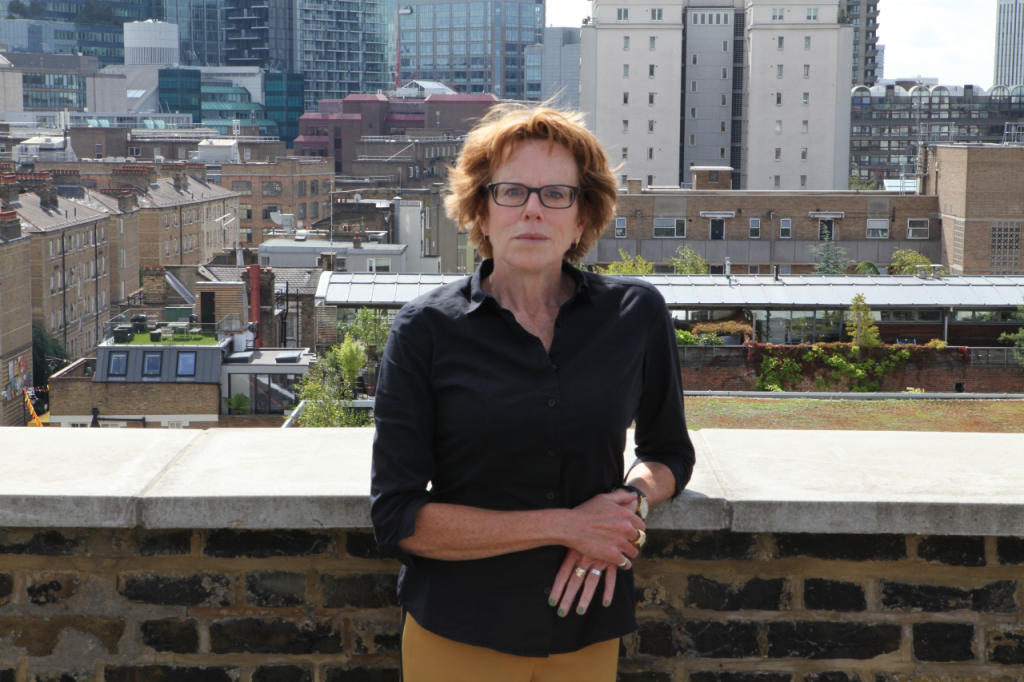
Location: London
Current job: Chief Executive at Shelter,
One word that best describes how you work: Positive
Your biggest success: Times when I’ve been able to use my privilege and influence as a leader to actually change things
Your greatest fear: Big scary looking dogs
Your biggest dream: A generational change in housing policy, which I helped bring about
Your favourite movie: At the moment, Rocks
First of all, tell us a little about your background and how you got into the charity sector.
I started my career as a journalist and specialist early on in social policy. For many years, I absolutely loved journalism, but eventually, I started feeling it wasn’t as much of an opportunity to make a difference as I had once thought. Maybe I got less idealistic, and that’s why I joined the charity sector – which is ironic because I think a lot of people think working in the charity sector must be about as idealistic as you can be!
Tell us more about Shelter and what has been the impact of the pandemic in your workday?
Shelter exists to defend the right to a safe home. We are here to change things for the better by working with individuals, in communities, and across society. I have about 1400 incredibly committed, talented and expert colleagues who make that happen. In terms of the impact of the pandemic on my working day personally, the main thing has been that I have hardly seen a colleague face to face for nearly a year now. I am now missing everyone very badly and struggling to think of ways of being the best leader I can be under these circumstances. It’s also meant some difficult decisions having to be made very rapidly and under a lot of pressure.
How much digitalisation has helped the charity sector and Shelter in these difficult times?
I am very proud of our response to the pandemic, and it would simply not have been possible without our use of technology, from directly providing digital advice to the fact that our telephone tech allows colleagues to answer our helpline from anywhere in the country – or indeed further afield: when the first lockdown started, one colleague was stuck visiting family in Pakistan and answered helpline calls from desperate people facing homelessness in England from his rooftop in Lahore!
Shelter‘s partnerships have the best cause/purpose alignment, can you give quick advice to small charities on how to look for the best partnership ‘match‘?
I think the answer is in your question: if a company or organisation doesn’t share your values and genuinely buy into your purpose, the partnership will be continually strained and may be more trouble than it’s worth if you’re writing a funding proposal that feels like squeezing a square peg into a round hole, thinking again. Having said that, though, for smaller organisations, there often simply isn’t the luxury of avoiding going for every pot of funding you can see. So I would turn the challenge back onto funders: listen to the organisations that really need the money; don’t think you know better than they do; don’t be afraid to fund core costs – if you need a back office, why do you think a charity doesn’t?
How do you recharge? What do you do when you want to forget about work?
I really need to get outside, and I’m probably most relaxed when climbing or on my bike. I think that’s why I’ve been struggling more in Lockdown 3 than in previous lockdowns because the weather has been so awful. Cycling really helps me to reflect. If I have something difficult to think about, it can be resolved by the end of a couple of hours on the bike. Climbing is different because you can only think about what you’re doing. I need both. Recently though, my job has become a lot less creative, and I’ve been having to consume a lot of arid information and make a lot of decisions, and I’ve been missing using my creativity (such as it is!). I’ve been trying to do more writing, and play the piano, to compensate. I am very lucky, though, in that I have a wonderful partner and two brilliant daughters. I love talking to them. And we have enough space to live in. This past year has made me more aware of my own privilege than ever.
What are you currently reading, or what’s something you’d recommend?
When I’m not on holiday, I can’t manage to read anything outside what I have to read for work. It’s a nightmare. And because I couldn’t get away to Ireland last summer like I do every year, I read a tiny fraction of the fiction I would usually read on holiday. So instead, I will recommend what my eldest daughter has been doing during the pandemic. She set herself the challenge of reading every single book by Marian Keyes, and boy did she enjoy it!
Fill in the blank: I’d love to see _____ answer these same questions.
Sarah Hughes CEO of Centre for Mental Health
What’s the best advice you’ve ever received?
My Dad once said: “You’re not special, you’re just lucky”. Accepting that is accepting privilege. And that is a lifelong challenge.
What’s the best advice you would give to Millennials who want to approach the non-profit sector?
Find a cause that matters to you—a lot.
You can follow @Sheltercharity on Instagram.
We love to interview charity’s leaders and listen to their work and their way to create great partnerships. If you want to learn about Brand Strategy and how your Purpose-Cause match can be effective and well-communicated check how we can help.
WGDS is a Digital Agency based in London specialized in optimizing the digital presence of brands and charities.
I’m Louisa Mitchell from West London Zone and this is #MYCHARITY
This week on the #MYCHARITY series, we speak to Lousia Mitchell CEO of West London Zone, a charity offering children and young people access to new opportunities in their community.

Location: West London
Current job: CEO of West London Zone
One word that best describes how you work: determined
Your biggest success: every child who has overcome a challenge or achieved a goal supported by West London Zone
Your greatest fear: giving up on hoping for a better future
Your biggest dream: that the children and young people we support go on to thrive in adulthood and our west London community becomes a more equitable society
Your favourite movie: Good Will Hunting
First of all, tell us a little about your background and how you got to where you are today.
I started my career in finance. It was a good role for developing my ability to focus, pay attention to detail and work hard, but my heart was never in it. I went on to work in ‘socially responsible investment’, journalism and policy, and it was this plus some travels around the world, that got me into working with children and young people and through which I found what really motivates me, what I feel really passionately about. It’s pretty simple really, I just don’t like unfairness. I can’t bear that some children in our country, which is full of opportunity, are not furnished with the tools to thrive in life and I believe we can change that, with the right support in the right way at the right time.
Tell us more about West London Zone organization and what were the significant changes in your workday during the pandemic?
We are aiming for a west London community where all children and young people have access to the support they need to enable them to overcome challenges and achieve their goals so that they can go on to thrive in adulthood and contribute positively to their community.
We provide a personalised 2-year programme of support for every child we work with using our team of trusted adults – West London Zone Link Workers – who are based full time in a school and know the children really well. They guide and champion each child and are responsible for designing and facilitating each child’s 2-year programme with them, their families and their teachers. Programmes often include specialist support such as therapy, drama, sport and catch up literacy, delivered in partnership with organisations working locally.
During the first lockdown, when schools were closed, we were unable to deliver the specialist support children needed, so our Link Workers shifted to daily wellbeing check-ins and facilitating emergency support as needed – food, technology, paying bills, activity and learning packs in partnership with the schools. By the summer, we managed to mobilise some remote specialist support – therapy, catch up tuition. In the Autumn term, every Link Worker has been in school, guiding the children through the return to school and mobilising as much specialist support as they can to keep the children engaged in school, remaining positive and focused, and addressing their learning loss.
My team is working in very tough and restrictive conditions at the moment, so my job has been to keep us financially robust and to ensure that everyone has the training and support they need to do their jobs well and keep their wellbeing in check. For example, all Link Workers were trained in trauma-informed practice before they return to school in September and have additional clinical supervision this term. I have never been more proud of my team, every single person at WLZ has demonstrated an extraordinary commitment to getting children and families what they need this year and empowering them to take ownership of their futures in an increasingly difficult landscape.
What are the main changes in the charity sector following these difficult times? How digitalization can help?
We have had to adapt quickly again and again in order to provide what children and families need in a constantly changing environment. We are a small organisation so we can be nimble, and our model is to provide personalised support for every child – and every child is different. So we were naturally able to pivot and provide what they needed in a new environment. My team showed extraordinary adaptability as we gripped how to work with new tech platforms and how best to communicate with each and every child and family. We also have a diversified funding model and are deeply embedded in schools and working in partnership with other local organisations and services, so those partnerships held us in very good stead.
But the pandemic has put the charity sector under enormous pressure as the demand for services is rising all the time, but fundraising opportunities have been lost. I fear that this situation will continue to escalate for many months, years yet and I am constantly trying to look and plan further and further forward to ensure our sustainability while also having to adjust and adapt daily in the here and now. Technology is a massive help, but it isn’t the whole answer. For example, we have had to make group tuition and other sessions smaller and shorter for the children to keep them focused and make the most out of each session, so it’s difficult to get them all the support they need.
West London Zone has many partnerships with businesses and charities, how challenging is to align your cause with a purpose?
I always say that ours is a very practical model of support. We operate according to the principles of ‘Collective Impact’. For us, partnership is not me, as the CEO, sitting around a table with other CEOs talking about how we might strategically align our organisations – although that’s important too – it’s about practically bringing people together, on the ground around individual children, one child at a time.
Our focus is the children. Every person and every organisation involved in our network is focused on the children and therefore wants the best for every child. We have learned over the years that if we keep that focus, it is not challenging to align. It’s when other things get in the way that challenges arise. And when that happens, we have learned to drill down to the individual child or children involved, and then we can nearly always get there.
How do you communicate to your donors/followers a partnership on your digital channels?
We are very relational in our approach to all our work – it’s one of our values. So our delivery model is all about relationships, and that spills across to all our work that supports that delivery. We have always done lots of meetings, school visits and events with the children, but that has not been possible this year. So we have stepped up our virtual communication – through video briefings including a range of team members, and more regular written comms via our ‘insight of the month’ newsletter and a more systematic approach to how we communicate on social.
How do you recharge? What do you do when you want to forget about work?
I’m not very good at forgetting about work. My whole team is incredibly dedicated and works very hard. We are all passionate about what we do and I love the fact they send me podcasts, videos, articles and books on social justice issues because they care so much. I’m not sure if listening to or reading those counts as recharging. I often listen to them when running or walking. I like to be active and the increased number of hours at the computer over recent months has been challenging for me – while I am indebted to Zoom and Google hangouts and Teams and so on, I don’t enjoy using them one bit! Aside from that, meals, games and outdoor activities with my family are the times I guess I really forget about work. I learned early on when my own children were young that whatever else is going on, when you are with them, you need to be mentally and emotionally present…because you get back what you put in. They are my greatest battery re-charger and inspire me daily…and sometimes they are my greatest exhaustion!
What are you currently reading, or what’s something you’d recommend?
During the first lockdown, we set up a West London Zone book club to provide the team with some relaxation and social activities. Books have been around the theme of inclusion as we work hard to ensure that the values we adopt in our work with children and families every day drive towards inclusive practice and we need to translate those across the whole organisation too. The latest book was Queenie by Candice Carty-Williams which gripped my attention with some brilliantly unexpected twists in the plot.
Fill in the blank: I’d love to see _____ answer these same questions.
I am continually impressed by so many of the people I meet who are trying to develop the systems we need to support children well in this country, particularly those trying to adopt a collective impact and deep partnerships approach. In particular, Ed Vainker, CEO of Reach Hub Feltham continually inspires me. As do many of the headteachers I meet in our Zone – too many of them to name but their dedication and commitment is incredible. As do my West London Zone Link Workers – again too many of them to name, but Farial Missi, our Deputy Head of Link Work who was one of our first Link Workers back in 2015 is an inspiration to us all at WLZ on a daily basis.
What’s the best advice you’ve ever received?
My father worked incredibly hard his whole life and he used to cite the wartime quote: ‘Time spent in reconnaissance is rarely wasted’. I think it’s another way of saying: ‘It’s all in the preparation’. I do believe in luck, but I also believe in preparing for every meeting, every eventuality and in forging really strong and positive relationships. If you do that and you work hard, you can be pretty sure you will be ready to never waste an opportunity. I can’t bear a wasted opportunity.
What’s the best advice you would give to Millennials who want to approach the non-profit sector?
My first job wasn’t in the charity sector, it was in finance as I’ve explained earlier. Although I didn’t love it, it furnished me with great skills. I think it’s really useful to go into a first job that is going to provide pragmatic and useful skills to fall back on throughout life and throughout different careers. This might be in the non-profit sector, or might not be. But I also think it’s important to enjoy work, so if you end up in a job you don’t love, you need to find another reason to stay in it and treat it as a stepping stone to a job you really do love. It’s also useful to supplement your life with other things that are going to motivate you and provide you with satisfaction in other ways while you cross that stepping stone. Volunteering can be a really powerful tool for that. If you do embark on a career in the non-profit sector early on in your career, I think it is important to find the cause that really speaks to you as it is a tough career path if you don’t feel wholly mobilised and driven by it every day. But I always remind people that you aren’t necessarily going to love every day at work, whatever you do…so be realistic!
You can follow West London Zone on Instagram @westlondonzone
We love to interview charity’s leaders and listen about their work and their way to create great partnerships. If you want to learn more how your Purpose-Cause match can be effective and well-communicated check how we can help.
I’m Claudia Curran, and I am #YOURCOACHINGPRO
This week we are interviewing Claudia Curran, founder of The Inner Impact, executive and life coaching business. An accomplished Finance Executive with over 20 years in the industry, Claudia decided to become a certified Executive and Life Coach to help people to get the best of them.

Business description: helping people get results – drama-free and stress-free
Current job: Executive & Life Coach
One word that best describes how you work: curiosity
My greatest success is: turning a life-controlling burden into a gift
My role model is: Sarah Blakely, CEO of Spanx
My favourite movie is: The Notebook
My comfort food is: Ben & Jerrys Chocolate Fudge Brownie
Best place to recharge: Kamalaya in Koh Samui, Thailand
First of all, tell us a little about your background and how you got the idea to found The Inner Impact
12 years ago, my husband was diagnosed with leukaemia, and three months later our baby passed away on her due date. I didn’t know how to process the grief; I thought moving forward with life and being strong would be the way. Little did I know that I was actually avoiding pain and that it would eventually show up. And it did, through anxiety. It started with occasional panic attacks and grew into chronic anxiety over the next 8 years.
There are so many different services and products out there for anxiety that I didn’t know where to start. I would try various ways, some of which might help for a short while before anxiety would return stronger than ever before. At first, I didn’t realise that I was combating the SYMPTOMS of anxiety, but not the ISSUE itself – which was my mind. I was extremely fortunate to come across an amazing life coach. She taught me the power of thought management and understanding how your brain works. It was life-changing. Our brain is arguably the most important asset we have, and yet we are never formally taught how to manage it. Whether it’s anxiety, relationship issues, or wanting to work on confidence, I then realised that once you learn the skills of supervising your mind, you can apply it to any aspect of your life. You then have this powerful life-changing skill with you always.
You have been able to transform your anxiety episodes not only in a strong resilience mindset but in a business, what were the challenges you faced in the first year of The Inner Impact?
Learning how to be comfortable with the fact that I am the product / and therefore the brand. I have always been rather shy about being in the public eye, so there was a bit of self-coaching to be done here! I had felt that if I didn’t share my story, then I wouldn’t be vulnerable. But now I know: When you are authentic, you are vulnerable. When you are authentic, people connect to you and trust you. When people trust you, the magic happens and you can help them.
We are living in an unusual time, how has the pandemic affected your business?
I work with a great number of people in the corporate world who were normally having meetings in person. The shift to Working From Home required some getting used to. Whilst a few were initially resistant to this idea, many today appreciate the benefits of this new style. It’s far more efficient in terms of time, but also, in some cases, it permits people to be more “vulnerable” (open) as they are in their familiar “safe” surroundings, so it’s easier for them to reflect inwards. The pandemic has taken my business almost 100% online now; previously all my clients were based where I was located, now my clients are GLOBAL. Now, people look for the right coach for them, rather than for a coach located near them.
How do you see The Inner Impact in 2 years?
Currently, all the coaching is done on a 1:1 basis. Next year I will be launching group coaching programmes. I envisage that in 2 years’ time, most of what I offer will be coaching on a group level. Group coaching allows people to uplevel themselves by being within a carefully curated group of like-minded peers. You get to access other people’s ways of thinking, expanding your limitations to what’s possible and causing you to grow yourself to new levels, all within a safe and confidential container. It is the most powerful thing ever. The first group will be launching in the middle of next year and the programme will be running every 6 months thereafter. I will still be offering 1:1 coaching, but to a far smaller, selected base.
What is the coaching service you would like to suggest to everyone and why?
With my coaching programme, we zero-in on your strengths, change behaviours, and work to create a specific plan to actually get the results that you want. In just 6 months, 45 minutes per week, WE DIVE DEEP to get clear on what’s holding you back, what you really want, and make a plan for how to achieve it. I teach you proven techniques to manage your mind. You will leverage your problems to work for you and create new results. I help you become a person who achieves what you want.
How do you find the right work/free time balance in your day?
It all comes down to planning. A lot of people think planning your entire week out is very restrictive, but it’s actually the opposite. The key is to make sure you plan for all your free time in there FIRST. And from there, plan around it.
As #COACHINGPRO, what is your advice to maintain our mental wellbeing during this stressful period?
Be kind to yourself. We live in extraordinary times where there is so much uncertainty in all aspects of life. Take this opportunity to get to know yourself, and really understand WHY you feel the way you do. Get into the habit of taking 5 minutes in the morning to write down everything that is on your mind, no filter, no edit and without judgment – a brain dump of what’s in your head. We have 65,000 thoughts a day, and most of them are subconscious. Writing is a good way of helping you bring them to the conscious surface. When this happens, you understand yourself a bit better. You are then able to consciously decide if you want to continue thinking this way, or whether you want to do something about it.
Now please fill the gap about your 5 pro tips:
- Your golden rule to stay positive: the opposite actually! I embrace that life is not always going to be positive, that it is normally going to be 50:50, and that this is ok. This is how you grow, learn and know to truly appreciate the times when they are glorious.
- How to achieve your goals: Always understand WHY you want to achieve that goal, and HOW life will change for you once achieved. Let this be your motivator. Most important is spending time with yourself.
- A good exercise for your mind: Asking yourself “Why is this an issue for me?” at least four times to get to the real underlying root of the matter.
- A game for your brain: Taking the facts of the situation, and coming up with a completely different narrative to what you are currently telling yourself, to push yourself to see a different perspective.
- A book for your soul: Charlie Mackesy, The Boy, The Mole, The Fox and The Horse. My most recent discovery that I am sharing with everyone, from children to adults.
You can follow @theinnerimpact
I’m Massimo Cassani, and I’m #YOURNOVELISTPRO
This week we are interviewing Massimo Cassani, a well known Italian fiction writer, Journalist, and professor at ‘Bottega di narrazione’, a Creative Writing Academy. founded by Giulio Mozzi. Massimo speaks about his passion for writing and what is his opinion about digital transformation.
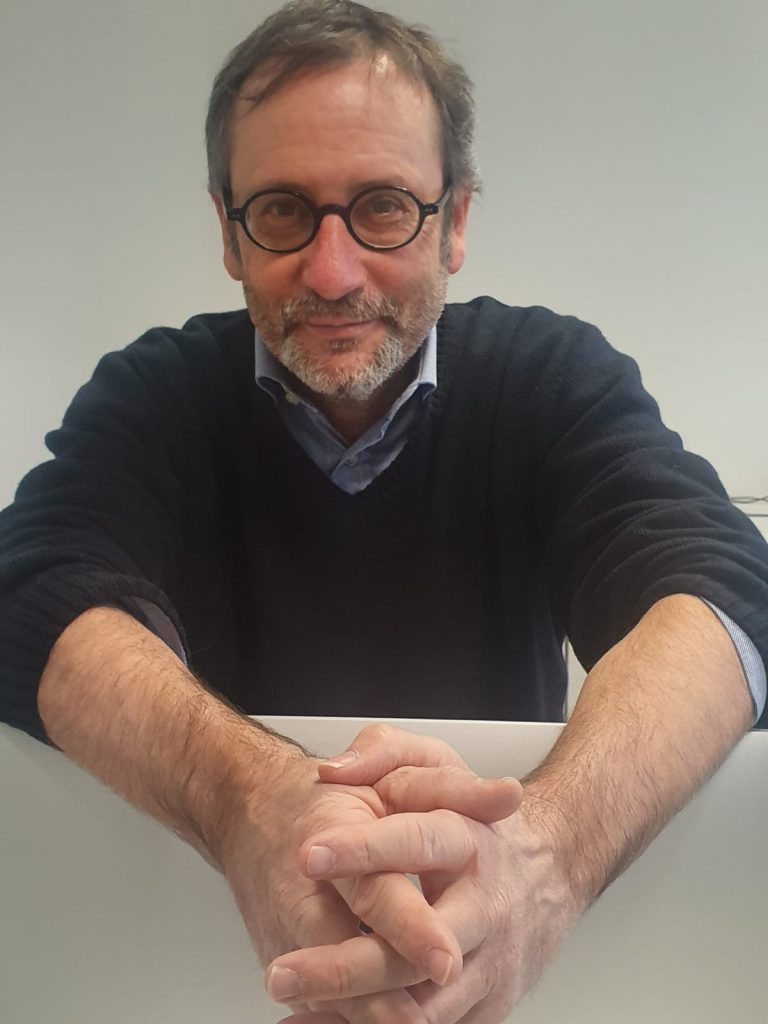
Location: Milano, Italy
Current job: writer, journalist and editorial director at “Ambiente&Sicurezza”.
One word that best describes how you work: quick, quick, quicker!
My greatest success: seeing my novels published.
My biggest fear is: disappointing myself
My favourite writer is: there are so many talented writers, I will pick an English one, Jonathan Coe, as my way to thank you for having me on your blog
My life dream: to continue publishing novels one after the other
First of all, tell us something about your background and when your passions for writing started.
I studied classics and then I specialized in journalism. My passion for the written word was born very early, together with my passion for writing. But I only dedicated myself to it when I felt ready enough to do it. My first novel is from 2008; I was forty-two, not really a kid!
How was the transition from being a journalist to a writer?
These are two completely different worlds. As a journalist, I have always tried to develop simple, accessible writing. The journalist’s goal is, first of all, to convey information through the medium of writing. As a writer, however, I have to focus not only on the contents but also on how to evoke emotions, even in the descriptions of the characters and places. We can say that writing novels can and must be played on several levels, and various nuances; by contrast, writing journalism has to be direct, and the more direct, the better.
How did you manage to keep both careers and at the same time, to collaborate with the writing academy ‘Bottega di narrazione‘?
I try to manage all my journalist work over the week and spend my free time working with Bottega di narrazione. It’s not an easy task because free time is so rare, but I believe we all have this problem nowadays. As for writing novels, it’s something that always goes on in my head.
Can you tell us a bit more about ‘Il Commisario Micuzzi’, when and how the character was born? Was the character inspired by someone in your life or does he have anything in common with you?
Il Commissario Micuzzi was born really by chance. An international literary agent asked me if I was available to develop the plot of a kind gentleman – non-writer – who had a good story (a true story) to write. I should have been a ghostwriter. I hadn’t published anything at the time; I had just finished writing a children’s novel with a friend (a novel that has never been published). I was enthusiastic about the proposal and straight away wrote the synopsis for the story which was enriched with other invented characters, including a minor character whom I called “Micuzzi” because in Italy it is an uncommon surname. But my synopsis was rejected, so I cut everything from the plot that wasn’t mine and made this Micuzzi the protagonist of the first novel (“Sottotraccia”). Micuzzi has a fatal distraction, like me: sometimes I go around the house looking for my cell phone and asking myself desperately: “But where will I have put my cell phone?”. Now the series is stopped, I want to write other things. But in the future, we will see..
‘L’ ultimo ritorno‘ is a different kind of book. Why did you decide to move away from detective stories into another genre?
“L’ultimo ritorno” is a family novel, yes, very different from the previous detective stories. Writing this story, however, I realized that the mystery, the secrets, the double games “live” well even outside the typical genre novels. And in family stories they “live” very well … many families are not the paradise that some want us to believe.
As #NOVELISTPRO, what do you think about the digital transformation? Do you believe it’s a good change or is digital somehow polluting the nature of writing?
Nothing lives forever, but above all, things change. I don’t think the past is better than the present and that the future will be worse than the age we are living. Writing is no exception. Today we write in a completely different way than a century or two ago, and in a century or two, the differences will be just as marked. Let’s not forget that writing is a medium and objects (ink and inkwell, ballpoint pen, typewriter, writing programs …) are just tools to express it. Even in the web age, there are those who know how to express themselves very well and those who seem semi-illiterate. The instrument certainly changes the writing, but I would not speak of “pollution”, I would rather talk of “contamination”. And contaminations are always fertile, in my opinion.
Tell us your trick to have a good work/free time balance in your day.
I really don’t have one! Unfortunately, there are no fences in my head, and everything gets confused. Sometimes it’s a resource, many other times it’s not. Maybe that’s why I’m so distracted.
Last but not least, tell us three books that you should bring with you on a desert island.
What a difficult question! I prefer not to mention the classics: they would be too many. I choose three novels from the ones I have read recently, and they impressed me: “Berta Isla” by Javier Marias, “Waiting for Bojangles” by Olivier Bourdeaut, and “What Happens at Night” by Peter Cameron.
Now please fill the gap about your five pro tips:
- Your golden rule in writing: let the stories grow inside my head, every moment, not just as I write.
- Best place to recharge: there is no specific place, the important thing is to walk, walk, walk.
- A movie to watch over and over: Ulysses’ Gaze by Theo Angelopoulos
- A game for your brain: I love to imagine possible things.
- A bit of advice for an emerging writer: reading is essential, yes, but reading while trying to understand what are the mechanisms that govern the stories is even more important. Often these mechanisms emerge even in the most unsuspected novels, even in those that are not considered masterpieces.
You can learn more about Massimo Cassani’s book here
I’m Dicky from Morse Toad and I’m a #WORLDCHANGER
This week on the #WORLDCHANGERS series, we speak to Dicky Broadhurst, founder of Morse Toad, a chocolate gifts company that creates personalised chocolate bar messages delivered to your letterbox.

Location: We are based in Lymington which benefits from both the beautiful New Forest and the seaside.
Current job: Morse Toad, I am the Chief Everything Officer.
One word that best describes how you work: Happily
My inspiration: My wife
My role model: Anyone who kept going.
My biggest fear: I’m not much of a worrier, to be honest, The only thing I worry about is my family.
My favourite e-commerce: Monster Supplies. They’re winning at the product, tone of voice, sense of humour.
Something I love: A good story.
Something I hate: Complainers.
First of all, tell us a little about your background and how you get the idea for personalized chocolate gifts.
Back in 2010, I was made redundant. Rather than find another job, I answered an ad in the paper asking me to cycle to Cape Town and the football World Cup for charity. Five and a half months later, we arrived in Cape Town exhausted but jubilant having crossed deserts, tropical forests and savannahs complete with every sabre-toothed beast you can think of. It was a great experience, made better by raising £10,000 for charity.
Shortly after completing the trip, I received a package. Inside was a few useful items, but there, hidden underneath it all, was a chocolate bar. It transpired that my Mum had sent the package 4 months earlier, but it had missed me at the first checkpoint. It had duly been shipped from country to country in hot (literally) pursuit of the avid cyclists. Saharan sun and tropical heat had not been kind to the chocolate, and by this point, it looked a shadow of its former self. But at that moment, I recognised it for what it was….a gesture of support from mother to son. Via the medium of chocolate, my Mum was saying ‘good luck; you can do it’.
Even in its miserable state, this chocolate packed a massive punch, and this got me thinking. Sometimes it’s those little gestures that make all the difference. In our world of relentless digital messages, a proper gesture, an actual physical thing, can go a long way to making a big impact on someone’s day, or even someone’s life.
And so Morse Toad was born. A messaging service dedicated to making small gestures with a big impact.
Does your chocolate passion come from your childhood?
Whilst I enjoy chocolate as much as the next person, my passion lies around the idea of making other people happy. If the opportunity is there to go a little bit further to make a much bigger difference to someone’s day, then you should take it. Life is short. Why not celebrate every moment? Get the balloons, make a cake, make a fuss of someone. You can’t underestimate the impact that might have.
Have you seen the clients’ behaviour changing on your e-commerce in the last six months?
The last six months have been the craziest ever for my business. We were very fortunate. What do you do when you can’t give someone a hug or a high five in person? You send a hug in the post. And send them we did.
It’s safe to say that, during the lockdown, there was an outpouring of love, positivity and humour that came through our little business. It was nothing short of extraordinary. Lockdown taught us what was important and what to be grateful for, and that is the other people in our lives.
What do you think it’s essential to adjust a business in this unusual time?
As a business owner, you often face challenges that come out of nowhere. Clearly, the pandemic is unprecedented, but behind every cloud is a rainbow. My hope is something positive will come from this tragic and challenging time. If I have adjusted anything during this time, it is to identify what really truly matters, and that is my family.
Where do you see Morse Toad being in the next three years?
We exist to connect people in unique and wonderful ways. We want to help people make the world a happier place, one small gesture at a time. So in three years, we will have created many more exciting ways for people to connect. Chocolate is just the beginning.
Today every business tries to find a way to give back to society, has Morse Toad been involved with a cause or a charity partner?
During the lockdown, we created a gift box specifically for NHS keyworkers. We shipped many hundreds of boxes and got amazing feedback from both the recipients and the senders, who were happy to give some moral support to those at the coal face.
– From an environmental perspective, in a bid to reduce packaging waste, we converted our chocolate box into part of the gift. Now you can add your photo to the top of the box. Once all the chocolates have gone, you can hang the box on the wall from the holes in the back. There’s no need to throw it away. There’s even the option to include a frame.
– We also offset our footprint by contributing to a tree-planting organisation.
Our gifts have the potential to lift the spirits of people in challenging situations. We are looking for an ongoing charity partner to work with on an ongoing basis.
How do you recharge? What do you do when you want to forget about work?
I am blessed to live in a beautiful part of the world. Every day I get out and about to enjoy the countryside with my family.
Best advice you would give to an aspiring entrepreneur just starting up their business
Be sure to celebrate every success and brace yourself for a marathon.
If you knew then what you know now, what would you have done differently?
I was so green when I started. I had no clue. If I were to do anything differently, it would be to find someone to help me inhouse. You can’t do it all yourself, and I have wasted so much money over the years paying for external help.
Last but not least, can you suggest the best corporate gift ideas?
Is it cheeky to suggest ourselves? With our corporate gifts, a business can apply their own branding or imagery to the top of the box. Inside, a message made from the best Belgian chocolate. We can send these, including shipping, for £10 each depending on the quantity.
During the lockdown, many businesses sent boxes to all of their staff working from home, and this Christmas represents a great opportunity to send something festive to clients all over the country.
You can follow Morse Toad on Instagram @Morsetoad
We love to interview #WORLDCHANGERS and listen about their challenges and their achievements. We can help you to optimize your Brand Strategy to reach your business goals.
I’m Anne Welsh from Painless Universal and I’m a #WORLDCHANGER
This week on the #WORLDCHANGERS series, we speak to Anne Welsh who, despite being born with sickle cell disease (SCD), transformed her illness into a strength becoming a successful entrepreneur, published author and an international speaker.

Current job: Founder and CEO of Painless Universal; Executive Board member for The Business School (formerly Cass).
One word that best describes how you work: Passion
My inspiration: Everyday people making a difference in extraordinary circumstances
My role model: My former boss. He is my role model because he believed in me and gave me strength and motivated me when I was at my lowest point. He inspired me to believe in myself, to be fierce and relentless in everything I did.
My favourite place in the world: Home
A quality you like most in people: Honesty
A food you can’t live without: I enjoy a good doughnut every now and then
First of all, tell us a little about you and how you have transformed your chronic illness into a strength?
The mental and physical effort that was needed to overcome the daily challenge of living with sickle cell disease (SCD) has pushed me to space where I can clearly see my own potential. I have been able to transform a chronic illness into a strength by surrounding myself with people who believed in me and never gave up on me, even at my weakest point. Also, I made a strong mental decision to approach life positively after a trip to Nigeria. It changed my internal thinking from one of feeling self-pity to one of feeling grateful; appreciating that my life is not the worst off and that so many people needed more than I could possibly imagine.
When was the moment you understood you could become a role model for all people struggling with chronic illness?
It started when I joined the Sickle Cell Society UK charity and became its Chairperson for two years. In this role, I heard so many stories of pain and realised my leadership could influence many everyday positive changes for people living with SCD. I really understood that I was becoming a role model for many people struggling with Chronic illness in 2016 when I started being approached for my advice on how to deal with issues of pain by patients and carers. I was also invited to give a large number of talks on these issues. I believe this happened because I have always tried to build on positivity, compassion and empathy by mentoring and reaching out to people with chronic illness through business, my charitable undertakings and with the launch of my book Pain-less.
Tell us about the journey to becoming an Instagram influencer, and how did you build up more than 700K followers?
This was not an overnight success. I built the number of followers gradually by speaking at events and encouraging people to follow my page. Big strides happened in 2017 when I changed the content focus and simultaneously improved the quality of my posts. The interest really started growing when I began to share stories of places I was visiting, how to deal with pain and my family adventures.
It’s fantastic to see a social media platform used to deliver and share a positive message about pain, do you believe digital transformation can make our life better?
Of course, digital transformation can make life better. Already I am seeing this outcome for the Painless Universal business. On this platform, we use the digital space to share stories of inspiration, hope and how people have found joy along the way. It is a really strong example of how the use of digital technology facilitates the sharing of inspirational stories quickly and to a global audience. Some people will have better lives because of access to this information.
You have a wide variety of video interviews on your social platforms, how do you choose your guests?
It’s all in the story – how the person being interviewed is able to share and inspire. The story must come from the heart with deep feeling. I read a person’s profile and can immediately tell if they are the right fit. I also do basic research on the person. The method is a very holistic process by which all types of media are researched to match the individual to the right story. I also listen to current events and take suggestions from my team to help choose and appreciate a pain topic of interest to the audience.
Where the idea of founding Painless Universal came from?
It came purely from my book “PAIN-LESS – Living with Pain, Finding Joy”. During the launch of my book, I was speaking to guests at the event and I realised it was not just my story that was important but that of so many other people facing the same challenges as myself. I felt empowered to help others by understanding their pain and helping them find their joy.
Tell us about the journey of writing ‘Pain-less‘ your memoir about living life with sickle cell anaemia?
The journey was long, about five years long. It was long because I started in 2014 and stopped because I didn’t want my life to be out in the public at that time. I just was not comfortable including the negatives as well as the positives in my life. However, in 2018 I just decided to really go for it and get the book completed. My biggest fear of putting everything out there for the world to read was solved after talking to my family and friends and reading lots of positive memoirs form celebrities like Maya Angelou and more. I was no longer ashamed of my story, especially the unpleasant parts of my life brought on by my chronic illness and life circumstance. I felt encouraged to use my story to inspire others which turned into a very transparent life story sharing the journey of success and disappointments, and most importantly how I found joy along the way. I was committed to setting deadlines and working diligently with my publisher so that in the end the publisher delivered the books as promised and the London launch went off smoothly in June 2019.
How do you recharge? What do you do when you want to forget about work?
I really love what I do and I never want to rest from it! As someone famously said: do what you love and you never have to work a day in your life. Also, I often spend time with my family and my two sisters along with their children, and this really gives me an emotional lift. With so many young children around you don’t have time to think about work. I take a warm bath, exercise and sleeping without a setting a wake up on Sunday’s to ensure I get my rest.
Tell us about a movie you could watch over and over again?
Honestly, it is very had to choose just one film. I will say any movies on the Christmas channel – I can watch those over and over again any time of the year. It just gives me so much joy!!
To finish on a light note, as a fashion icon, who is your favourite designer?
Gianni Versace, for his opulence in life and how he projected that into his fashion experience. As a guest of a corporate event, I was fortunate to visit his Miami Beach mansion after his untimely passing. The detail and beauty of his home captured so much of his fashion personality, and for me, showed why to this day his classical designs live on and influence new generations of designers.
You can follow Anne Welsh on Instagram @ladyannewelsh
We love to interview #WORLDCHANGERS and listen about their challenges and their achievements. We can help you to optimize your Brand Strategy to reach your business goals.
I’m Brita from Women for Women and this is #MYCHARITY
This week on the #MYCHARITY series, we speak to Brita Fernandez Schmidt, Executive Director at Women for Women International – UK, a charity organisation helping women survivors of war rebuild their lives.
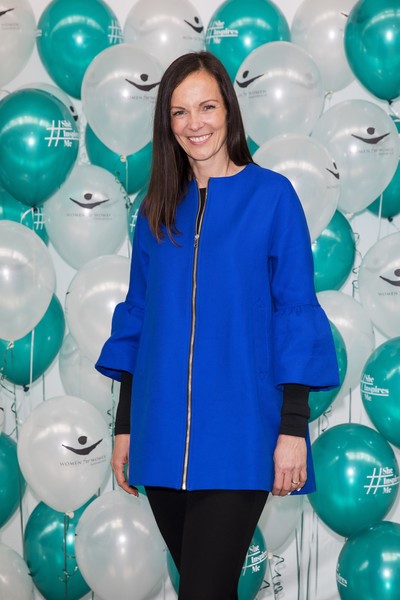
Location: London, UK
Current job: Executive Director
One word that best describes how you work: Inspiring
Your biggest success: Raising money to support Yezidi women, survivors of sexual violence after the 2014 Sinjar massacre in Northern Iraq
Your greatest fear: Allow fear to keep me from pursuing my dreams
Your role model: I don‘t really like the notion of role models. I want us to strive to be our best selves. Instead, I love inspiring women, who inspire me to be my best self. Many of these women are women who have survived conflict and adversity who I have had the honour of meeting through my work at Women for Women International
Your favourite food: Any type of salad with sweet potatoes fries
Your life dream: Inspire women to turn their fears to fierce
First of all, tell us a little about your background and how you got to where you are today.
When I was 14, I moved with my family from Germany to Venezuela and I saw poverty and its impact for the first time. I saw how it proportionately affects women and it ignited a passion within me to do what I can to promote equality and support women all over the world to know their power and uncover their potential. I did a MA in Women’s Studies 25 years ago and decided to work in the not for profit sector, as I saw it as the best fit to realise my purpose. For the past 12 years, I have been working with Women for Women International.
And I am excited to say that I have just finished writing my first book, which is a personal book that focuses on what I have learned about finding meaning, owning your power and transforming your world. It is called Fears to Fierce and is coming out in January 2021 and can be pre-ordered here.
Congratulations on your book, now tell us what makes Women for Women International a successful charity?
Women for Women International is a successful organization because it has staff who are experienced professionals and who care deeply, whether that is in the fundraising offices or in the offices in the countries where we operate our programme. Another reason for our success is our commitment to ongoing learning. We are never complacent, we always ask questions, we always want to know what is working and what is not working. We care deeply about the lasting impact of our work and we don’t shy away from changing track and, importantly, we innovate. We have adopted a permanent start-up mentality which has served us well.
How have you adjusted your working day to this special situation?
After three days of despair, once we had gone into lockdown, we decided that we needed to stop imagining every worst-case scenario under the sun and that we needed to start thinking about: WHAT CAN WE DO? Once we did that, everything shifted. That is the power of good questions, as soon as we started to ask this, answers came flooding in and within 5 weeks we had taken our biggest flagship event – our annual car boot sale – online; which in May raised £77,000. So my lessons learned is: pivot fast, focus on what you can do, fail fast, and don‘t wait to be ready.
What is changing in the charity sector in the pandemic era?
I cannot speak for the whole sector, and I think many of the trends we are seeing are true for the wider world – a drive to digital, working from home etc.
One thing I would like to highlight that has struck me is that NOT giving in to despair has been key – bringing new ideas and initiatives even in these times has been vital to our work and much welcomed by our supporters as a sign that there is hope. So that will be very important, for our work and our supporters!
How do you choose business partners to support Women for Women?
It’s all about shared values and vision! Business partners for us become our family. Whether it is Charlotte Tilbury Beauty, Net-A-Porter or Monica Vinader, everyone no matter where within the business buys fully into our partnership and that is at the heart of our successful collaborations.
Tell us about your favourite case history of the most successful partnership.
It’s so hard to choose. Charlotte Tilbury Beauty, is just incredible because of the size of the commitment and impact, with their £1 million pledge they are having an enormous impact in countries like Rwanda, Nigeria and Northern Iraq. But our partnership with Net-A-Porter has also been simply inspiring – not only has it raised a lot of money but it raises such awareness around the whole world, which is invaluable and cannot be quantified.
How do you recharge? What do you do when you want to forget about work?
I love running, so I do that every morning followed by yoga. And my other way to recharge is to read! I love books and I read all the time.
What are you currently reading, or what’s something you’d recommend?
The best question you could possibly ask me! Ok, so I always read several books all at once. Currently, I am reading What we’re told not to talk about by Nimko Ali; Women don’t owe you pretty by Florence Given, The truth will set you free, but first it will piss you off by Gloria Steinem; Me and White Supremacy by Layla F Saad; Recollections of my Nonexistence by Rebecca Solnit.
Fill in the blank: I’d love to see…
Faith Mwangi-Powell from Girls Not Brides answer these same questions.
Can you give us the golden rule to achieve your goals?
Shine Bright, Breathe and Let go! #FearsToFierce
You can follow WomeforWomen on @womenforwomenuk
We love to interview charity’s leaders and listen about their work and their way to create great partnerships. If you want to learn more if the Purpose-Cause match is effective and well-communicated check out how we can help.

